Samurai Marathon Blu-ray Movie
HomeSamurai Marathon Blu-ray Movie 
Samurai Marathon 1855 / サムライマラソン / Samurai marasonWell Go USA | 2019 | 104 min | Not rated | Jul 21, 2020
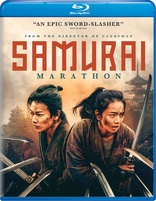
Movie rating
6.7 | / 10 |
Blu-ray rating
| Users | 0.0 | |
| Reviewer | 4.0 | |
| Overall | 4.0 |
Overview
Samurai Marathon (2019)
The American imperialists are at the door and intruding on Japan. To assess and train his troops the lord of the land announces a marathon through the land crisscrossing shores, forests and the mountain. The shogunate in Edo was not approving and views word of the contest with contempt and suspicion. Spies and moles are dispatched. One mole realizes the misunderstanding and is determined to stop lives and alliances being lost. He runs.
Starring: Takeru Satoh, Nana Komatsu, Mirai Moriyama, Shôta Sometani, Munetaka AokiDirector: Bernard Rose
| Foreign | Uncertain |
| History | Uncertain |
Specifications
Video
Video codec: MPEG-4 AVC
Video resolution: 1080p
Aspect ratio: 2.39:1
Original aspect ratio: 2.39:1
Audio
Japanese: DTS-HD Master Audio 5.1
Japanese: Dolby Digital 2.0
Subtitles
English
Discs
Blu-ray Disc
Single disc (1 BD)
Packaging
Slipcover in original pressing
Playback
Region A (B, C untested)
Review
Rating summary
| Movie | 4.0 | |
| Video | 4.5 | |
| Audio | 4.5 | |
| Extras | 0.5 | |
| Overall | 4.0 |
Samurai Marathon Blu-ray Movie Review
Reviewed by Jeffrey Kauffman July 17, 2020Stephen Sondheim recently celebrated his ninetieth birthday, and musical theater fans were of course thrilled when an assortment of Broadway luminaries (including several who ultimately matriculated to Hollywood) joined together to help celebrate the occasion in a (slightly delayed) internet bash. The evening was filled with one memorable Sondheim song after another, but it perhaps unsurprisingly skipped over the fact that while Sondheim’s songwriting prowess is probably unmatched in the annals of modern musical theater, his shows haven't always been huge successes, at least in terms of running for umpteen seasons and returning a hefty profit for their investors. After what some might call the hat trick of 1970’s Company (the link points to a revival released on Blu-ray), 1971’s Follies and 1973’s A Little Night Music (the link points to our listing in the movies database), Sondheim took a few years to write what would become his next musical, one that is still considered one of his more ambitious, if also perhaps problematic, works. Pacific Overtures opened in 1976 and sought to tell a tale of the “Westernization” of Japan, beginning in 1853 with the arrival of “outside” influences in the form of the United States in general and Commodore Perry in particular. Pacific Overtures was a dense, somewhat distant feeling, piece that was told in the style of traditional Kabuki theater (with men playing all roles, including those of women, until the last couple of minutes). While a succès d'estime, including racking up an impressive ten Tony Award nominations (winning only two, for set and costume design), Pacific Overtures turned out to be more of a “setting sun” (so to speak), closing after just a few months and reportedly losing oodles of money. The fact that Samurai Marathon was evidently originally titled Samurai Marathon 1855 may hint at the fact that it, too, is based in the same general time period as the one featured in at least the opening of Pacific Overtures. The film like the musical begins with Commodore Perry (Danny Huston) gruffly trying to make a "connection" with the Japanese powers that be, but that's just the first of several similarities between the musical and this film, both of which prominently feature the Japanese response to the "opening" of their once completely cloistered society. One of the things that some critics found perplexing about Pacific Overtures is how it supposedly had no "point of view" in terms of being skewed toward either the Eastern or Western perspective (an ambiguity that those who helped create the musical have gone on record as stating was absolutely intentional), but there's arguably somewhat less of a lack of clarity at play in Samurai Marathon, since this film's point of view is pretty unabashedly Eastern, offering what amounts to a Japanese "push back" to encroaching Western influences, in this case in the unlikely form of a foot race run by samurai.

If legendary Broadway director Harold Prince, who collaborated with Sondheim on all of the above shows (including Pacific Overtures), might have seemed like an unlikely choice to stage a “Kabuki musical”, some film fans may feel more or less the same way about Bernard Rose helming Samurai Marathon. Rose has made his name at least partially in the horror genre, with films like Paperhouse and Candyman (a film rather amazingly heralded in the trailer for this film). But Rose also has a couple of historically based films to his credit like Anna Karenina and Immortal Beloved which may be at least a little bit more in line with what Samurai Marathon has to offer. The fact that Samurai Marathon probably has less of the swordplay than typically informs a lot of samurai films, and is supposedly based on “real” history, may help to elide any qualms in this regard, but one way or the other, Samurai Marathon is frequently a very stylish film, one which Rose keeps visually interesting throughout a wending tale that includes several interlinked subplots.
Samurai Marathon perhaps assumes unwisely that Western viewers will have enough knowledge to understand some of the context the film just basically plops down without much explanation. That includes the fact that during this period, various “domains” in Japan were run by clans, including the so-called Annaka Domain which was ruled by the Itakura family. Samurai Marathon offers Itakura Katsuakira (Hiroki Hasegawa) as a samurai who has nightmares about what the arrival of Perry and the West in general may mean for Japan. Itakura is also concerned about his daughter Yuki (Nana Komatsu), an accomplished artist who has a yen (sorry) to explore the world, but who is being consigned by her father into an arranged marriage with Tsujimura (Mirai Moriyama). Suffice it to say that Yuki doesn’t respond well to this demand, and undertakes a certain Mulan-like way to escape her fate.
The story also deals with Jinnai Karasawa (Takeru Satoh), a “bean counter” for the Annaka Domain who is in reality an undercover spy for the Shogun, following in what has been a longstanding tradition for his family. Jinnai misunderstands Itakura’s call to samurai to band together for a marathon (in an exercise — literal and figurative — designed to promote unity and a “Japanese” identity) for a brewing rebellion, leading to a number of unexpected consequences. And indeed much of Samurai Marathon hinges on characters simply not “getting” what’s actually going on, as is detailed overtly in the very opening scene where Perry and the Japanese simply can’t ferret out what the “other side” is saying.
A number of other characters also are introduced as the film moves on to the "marathon" part of its title. There's a surprising amount of palace intrigue playing out in the background as the race continues, and there are both uplifting and horrifying events that ensue. The well crafted screenplay keeps the intersecting plotlines clear (with an understanding that, as mentioned above, some Westerners may have occasional stumbling blocks with regard to overall context), though it might be faulted for occasionally dipping into more melodramatic territory. One way or the other, Rose offers some absolutely stunning vistas and the film generally speaking also features really handsome production design that brings its historical milieu fully alive.
Samurai Marathon Blu-ray Movie, Video Quality 
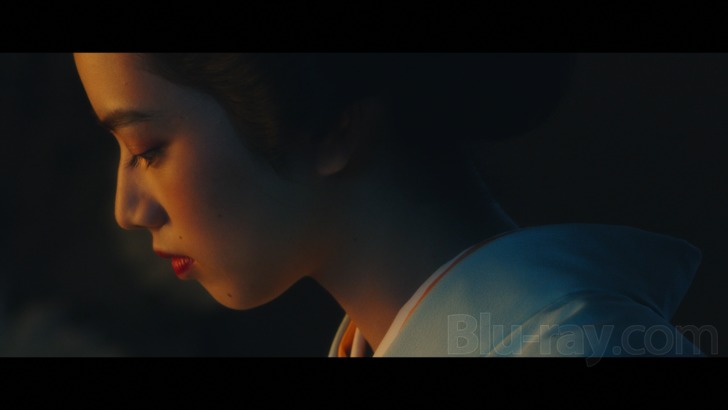
Samurai Marathon is presented on Blu-ray courtesy of Well Go USA with an AVC encoded 1080p transfer in 2.39:1. The IMDb once again lacks any significant technical data about the shoot, but cinematographer Takuro Ishizaka's own site lists the Panasonic Varicam as having been utilized. I'm frankly not as familiar with this line of camera as I am with some others, but from what I've gleaned online, it appears that at least some models capture in native 4K, and from the look of this often quite beautifully detailed transfer, I personally wouldn't be surprised if the DI was finished at 4K, though authoritative information about that particular data point I haven't been able to uncover. The palette is often breathtakingly vivid, even in what almost look like the gray skies and drab greens of the Pacific Northwest. Interior scenes, including some in pretty prevalent darkness, still have really nice detail levels for the most part. The interplay of yellows and reds throughout the film is often quite striking. There are a few passing issues with banding, noticeable for example in the very first fade in the film, but otherwise this is a really beautiful presentation.
Samurai Marathon Blu-ray Movie, Audio Quality 
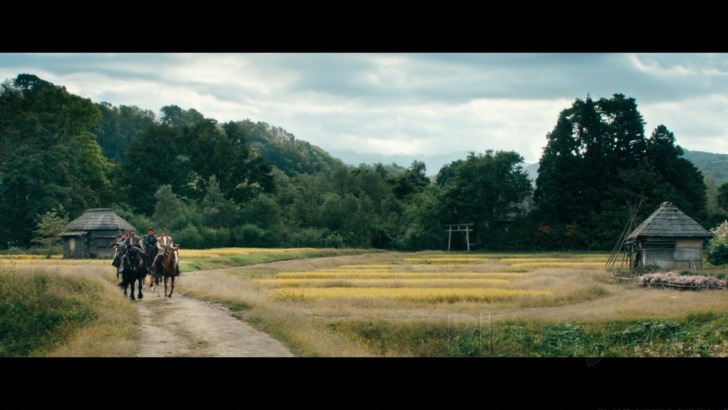
Samurai Marathon features a nicely immersive DTS-HD Master Audio 5.1 track, one which exploits some unusual (for a samurai film, anyway) minimalism courtesy of its score by Philip Glass. The ubiquity of outdoor material throughout the film also provides great opportunities for regular ambient environmental noises, and the relatively few battle scenes erupt with appropriate fury. Dialogue is presented cleanly and clearly throughout the presentation. While English subtitles are available, they only translate the Japanese, and so won't be of any SDH help for the (relatively few) English language dialogue moments (as in the opening scene with Commodore Perry).
Samurai Marathon Blu-ray Movie, Special Features and Extras 
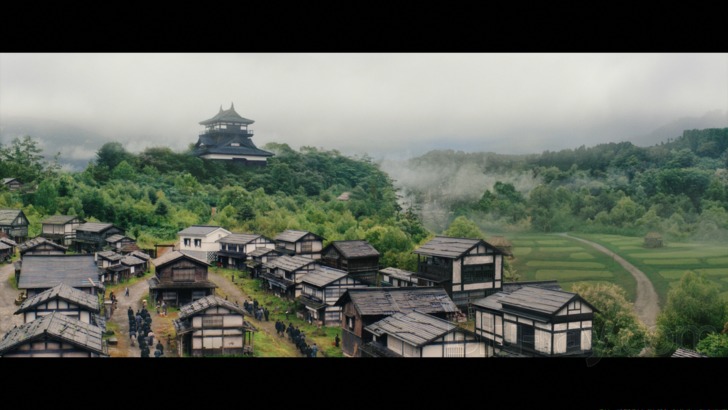
- Trailer (1080p; 2:15)
Samurai Marathon Blu-ray Movie, Overall Score and Recommendation 
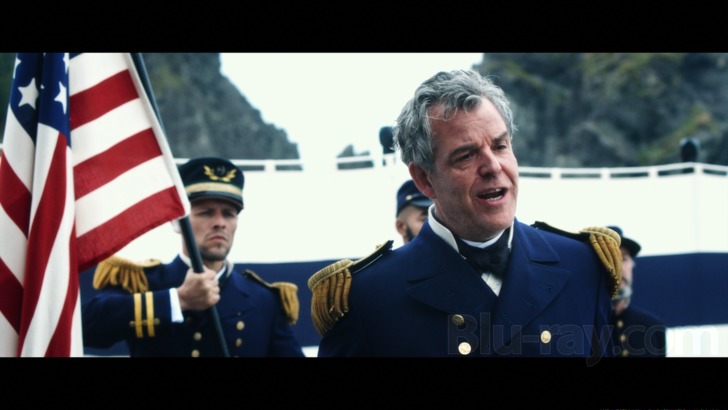
There is an absolutely incredible song from Pacific Overtures called A Bowler Hat, a song which Sondheim cites as his own personal favorite among the many classics he's written, where Sondheim is able to sum up the entire "Westernization" of Japan courtesy of one character's experiences. That song may provide an unforgettable "ClifsNotes" version of what Japan experienced after the West started making inroads, but for a rather unique and scenic take on the same general underlying idea, Samurai Marathon is visually vivid if occasionally dramatically overwrought. Technical merits are solid. Recommended.
Similar titles
Similar titles you might also like

The Battle of Chile: Part III
1979

The Battle of Chile: Part II
1976

The Battle of Chile: Part I
1975

The Defensive Power of Aikido
激突!合気道 / Gekitotsu! Aikidô
1975

Echoes from a Somber Empire
1990

Wrath of the Wind
Trinity Sees Red
1970

Witchhammer
Kladivo na čarodějnice / Witches' Hammer / The Witch Hunt
1969

The Emperor in August
日本のいちばん長い日 / Nihon no ichiban nagai hi ketteiban | Limited Edition to 3000
2015

Black Venus
Vénus noire
2010

The Assassin of the Tsar
Цареубийца
1991

No
2012

Farewell, My Queen
Les adieux à la reine
2012

I Wish I Knew
海上传奇
2010

The Admiral: Roaring Currents
Myeong-ryang
2014

Robinson's Garden
Slipcover in Original Pressing
1987

Death Whistles the Blues
La muerte silba un blues
1964

Voyage Into Space
1970

Deadly Outlaw Rekka
Violent Fire / 実録・安藤昇侠道伝 烈火
2002

I'll Be Alone After Midnight
Je Serai Seule Après Minuit
1931

Shoah: Four Sisters
Les quatre soeurs
2018